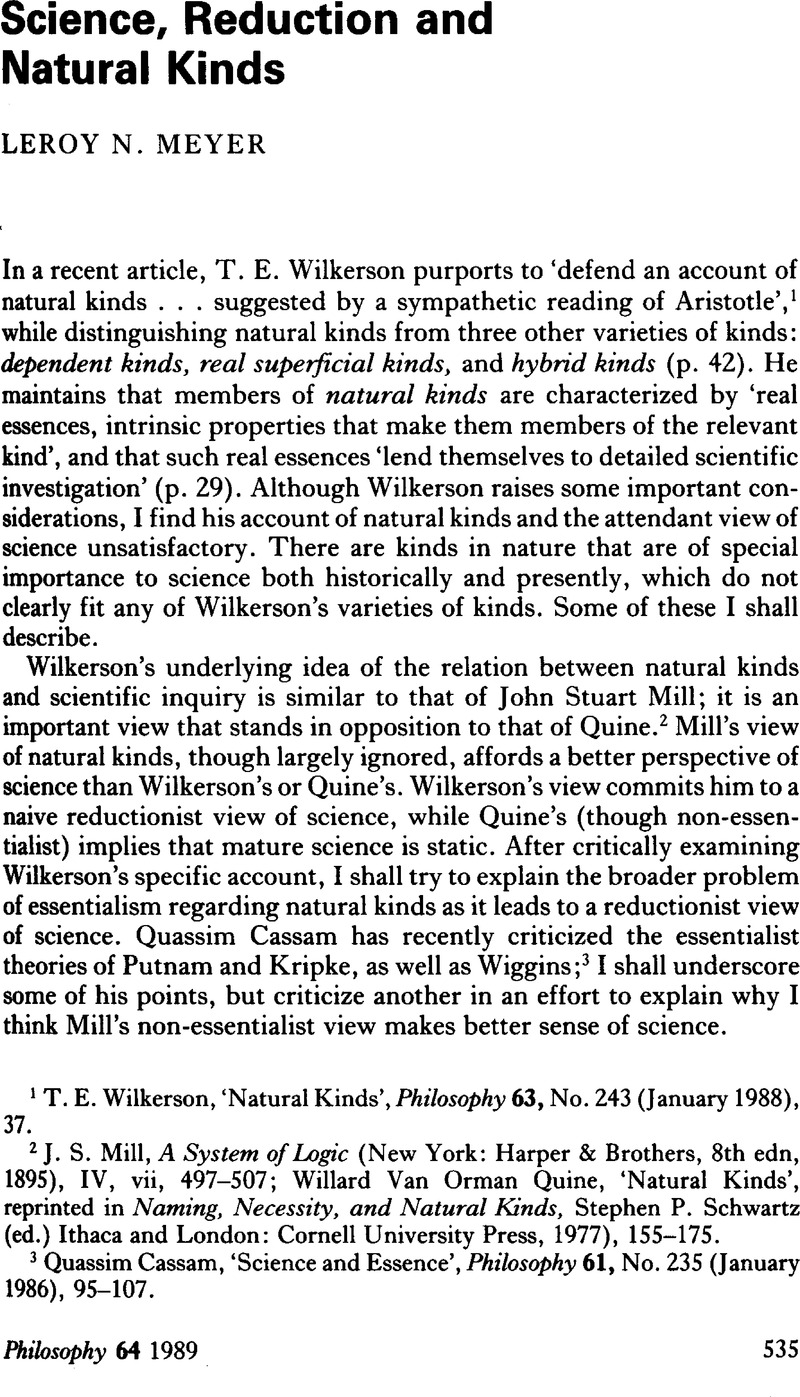Article contents
Science, Reduction and Natural Kinds
Published online by Cambridge University Press: 30 January 2009
Abstract

- Type
- Discussion
- Information
- Copyright
- Copyright © The Royal Institute of Philosophy 1989
References
1 Wilkerson, T. E., ‘Natural Kinds’, Philosophy 63, No. 243 (01 1988), 37.CrossRefGoogle Scholar
2 Mill, J. S., A System of Logic (New York: Harper & Brothers, 8th edn, 1895), IV, vii, 497–507Google Scholar; Van Orman Quine, Willard, ‘Natural Kinds’, reprinted in Naming, Necessity, and Natural Kinds, Schwartz, Stephen P. (ed.) Ithaca and London: Cornell University Press, 1977), 155–175.Google Scholar
3 Cassam, Quassim, ‘Science and Essence’, Philosophy 61, No. 235 (01 1986), 95–107.CrossRefGoogle Scholar
4 See Franklin, James, ‘Aristotle on Species Variation’, Philosophy 61, No. 236 (04 1986), 245–252CrossRefGoogle Scholar; and Granger, Herbert, ‘Aristotle and the Finitude of Natural Kinds’ Philosophy 62, No. 242 (10 1987), 523–526.CrossRefGoogle Scholar
5 The limitations of supervenience in regard to science are discussed in Haugeland, John, ‘Ontological Supervenience’, Southern Journal of Philosophy 22, Supplement (1984), 1–12CrossRefGoogle Scholar; an ambitious application of supervenience is in Post, John F., The Faces of Existence: an Essay in Nonreductive Metaphysics (Ithaca and London: Cornell University Press, 1987).Google Scholar
6 See Scott, George P., Atoms of the Living Flame: an Odyssey into Ethics and the Physical Chemistry of Free Will (Lanham, Md., New York and London: University Press of America, 1985), Ch. XI, 169–188.Google Scholar
7 See Nicolis, Gregoire and Prigogine, Ilya, Self-Organization in Non-equilibrium Systems (New York, London, Sydney and Toronto: John Wiley & Sons, 1977).Google Scholar
8 Quantum Theory of Collective Phenomena (Oxford University Press, 1986).Google Scholar
9 Sameness and Substance (Cambridge, Mass.: Harvard University Press, 1980), 203.Google Scholar
10 O'Neil, Robert V. [ et al. ], A Hierarchical Concept of Ecosystems (Princeton University Press, 1986), 210–211.Google Scholar
11 The Fortunes of Inquiry (Oxford: Clarendon Press, 1986), 60–80.Google Scholar
12 Scientific Progress (Dordrecht, London, and Boston, Mass.: D. Reidel, 1981), 99.Google Scholar
13 I am grateful to Herb Granger for his insightful comments, and to George P. Scott for helpful discussions regarding non-equilibrium thermodynamics. This paper is based upon research supported by a grant from the University of South Dakota General Research Fund.
- 2
- Cited by


